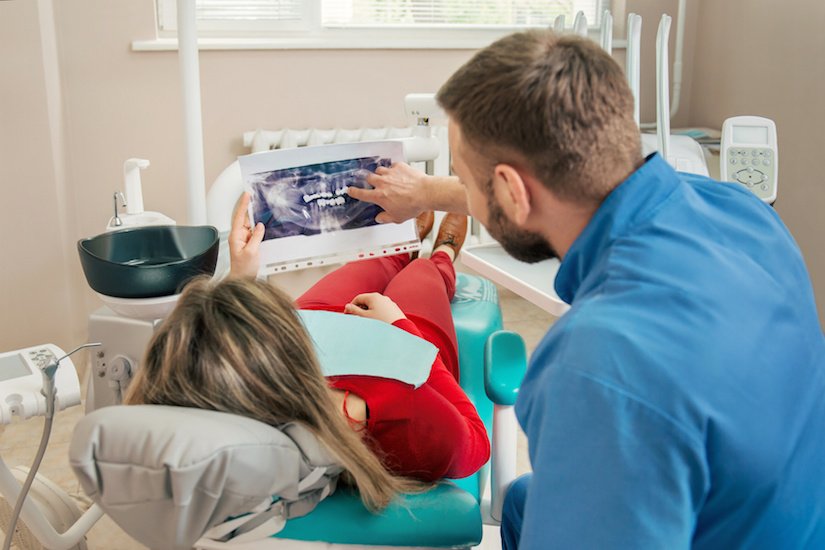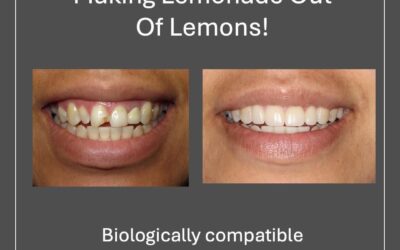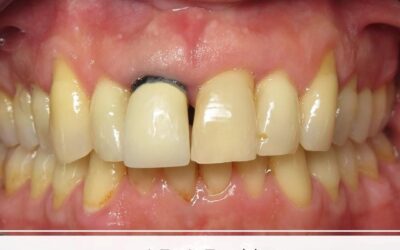Should Wisdom Teeth Be Removed?

Should they stay or should they go? Until recently, conventional wisdom (no pun intended) was that wisdom teeth should always be removed, most commonly during a person’s teen years.
But what about today? Should wisdom teeth be removed? Let’s take a closer look at modern dentistry’s take on wisdom teeth, and the arguments for and against their removal.
What Are Wisdom Teeth?

Photo Credit: Brownpau on Flickr
Wisdom teeth, also known as the third molars, are the chewing teeth found in the very back of the mouth. They differ from your other teeth in that you’ll only have one set in your lifetime (there are no baby wisdom teeth), and they’ll start appearing (erupting in dentist-speak), in your late teens or early twenties.
 Wisdom teeth are vestigial, meaning that they’re a remnant, leftover from our early human ancestors (kind of like the appendix). The skulls of early humans were larger and needed more teeth to chew the tough fibrous plants that made up their diet. As humans and their diets evolved (or “devolved”, depending on what you think of the Standard American Diet), jaws and skulls became smaller, and the need for extra molars was reduced.
Wisdom teeth are vestigial, meaning that they’re a remnant, leftover from our early human ancestors (kind of like the appendix). The skulls of early humans were larger and needed more teeth to chew the tough fibrous plants that made up their diet. As humans and their diets evolved (or “devolved”, depending on what you think of the Standard American Diet), jaws and skulls became smaller, and the need for extra molars was reduced.
It’s interesting to note that according to some estimates, up to 25% of Americans don’t have wisdom teeth at all. Dental x-rays, taken at a checkup during your teen years can see if you’re one of the lucky few.
Wisdom Teeth Today
 Today, wisdom teeth don’t serve the same purpose as they once did. Modern dentistry and home care (careful, regular brushing and flossing), greatly reduce the chances of a lost molar early on in life. Today’s diets, which include more easily chewable foods, also reduce the need for those extra teeth.
Today, wisdom teeth don’t serve the same purpose as they once did. Modern dentistry and home care (careful, regular brushing and flossing), greatly reduce the chances of a lost molar early on in life. Today’s diets, which include more easily chewable foods, also reduce the need for those extra teeth.
Interestingly, there is one other purpose of wisdom teeth that I haven’t mentioned yet. They help disperse the occlusal load (the force of your bite) which can help prevent concussions. Something to think about if you’re an aspiring athlete!
But that doesn’t mean that wisdom teeth should be necessarily removed. In fact, my professional opinion is keep them if you can!
Why Wisdom Teeth Shouldn’t Be Removed
 Based on over 20 years experience, I know that not everyone can hold on to their wisdom teeth, for one reason or another (I’ll get to that soon).
Based on over 20 years experience, I know that not everyone can hold on to their wisdom teeth, for one reason or another (I’ll get to that soon).
First, wisdom teeth are a natural part of the human body. Removing them just because that’s the way things have been done for years isn’t a good enough reason for me, as a dental professional.
Other areas of medicine are also changing their conventional wisdom. The number of tonsillectomies and appendectomies have also decreased in recent years. Why? The risks outweigh the rewards.
Oral surgery is still surgery. And all surgeries (and all medical procedures) have risks. One of the biggest risks associated with any surgery is the use of anesthesia. General, local and twilight anesthesia are the most common forms of sedation used during wisdom tooth removal. Each has its own advantages and drawbacks.
General Anesthesia
Also known as full sedation, this is the riskiest form of anesthesia. Under general anesthesia, you’ll be fully unconscious and feel no pain, which many patients see as an advantage. For dental procedures, however, the risks of general anesthesia often outweigh the benefits.
Local Anesthesia
Local anesthesia removes sensation from a specific area of your bod, while keeping you fully conscious throughout the procedure. Some wisdom tooth extractions can be performed under local anesthesia, but patients may find the experience stressful. That’s why twilight anesthesia may offer the best of both options.
Twilight Anesthesia
Also known as conscious sedation, twilight anesthesia, combines a local anesthetic with a medicine to help you relax, or to reduce your memory of the procedure. This medication is often administered intravenously through a vein in your arm. Nitrous oxide, also known as laughing gas, is also commonly used. You’re still conscious, but will feel no pain and will be more relaxed than with a local anesthetic alone.
Other Risks of Wisdom Tooth Extraction
In addition to the risks associated with anesthesia, wisdom tooth extractions can have other complications. A limited number of patients may experience serious infections, or nerve damage as a result of the procedure.
Beyond the procedure itself, there can be lifelong effects of having your wisdom teeth removed that you may not realize until years later.
When wisdom teeth are removed, the bone that holds your teeth in place may shrink. As it does, it can pull the superior constrictor muscle of the throat forward, decreasing the diameter of your airway. This can lead to a lifetime of poor air exchange, snoring and poor sleep.
Sleep apnea, as it’s known, can can start as hypopnea (diminished breathing capacity, but not totally stopping breathing) and then progress to full-on apnea, the complete cessation of breathing. This is serious stuff! And there’s another very common dental procedure that can increase these risks: braces.
Orthodontic appliances can use constrictive forces to bring teeth together. This can re-shape and shrink a patient’s jaw, which diminishes the volume of the nasal airway. Combined with wisdom tooth extraction, the potential dangers of Upper Airway Restriction Syndrom or Sleep Apnea are very real.
When is Wisdom Tooth Removal Recommended?
That said, there are cases where wisdom tooth removal is recommended, or even necessary.
Your wisdom teeth should be removed when:
1. They are the cause of overcrowding in the jaw. Smaller jaws may not have room for all four wisdom teeth.
2. The teeth are impacted. When wisdom teeth don’t fully erupt through the gum tissue, they are considered to be impacted and may become trapped in the jawbone, requiring their removal.
3. The teeth are unhealthy. As they are located at the back of the mouth, wisdom teeth can be harder to reach and more cavity-prone than other teeth.
There’s also another significant consideration that leads to many young people having their wisdom teeth removed in their teens or early twenties: health insurance and finances.
Young people are likely to be covered by their parents’ insurance, reducing the out-of-pocket cost of wisdom tooth extraction, which can be expensive. Since it is possible for wisdom teeth to cause problems down the road, some patients opt to have them removed while the financial burden is reduced.
The financial concerns related to a major medical procedure can’t be ignored by most people. But if you do have that luxury, and your wisdom teeth are currently healthy, I recommend a wait and see approach. With regular dental visits throughout your life, you’ll identify potential problems early and can arrange for extraction of your wisdom teeth if absolutely necessary.
My Final Thoughts
Doing things the way they were done for years, out of sheer habit, is rarely a good idea. And when it comes to a field like dentistry, where new technologies and techniques are being developed every year, it can be downright dangerous.
We have a better understanding of the risks and benefits of wisdom tooth extraction than ever before. And it is my opinion that removing healthy wisdom teeth is not only unnecessary, it can be damaging to your overall health and wellness.
At Blodgett Dental Care, we’ll help you make the best decision about your wisdom teeth and offer high-quality restorative dentistry options.
Do you have questions about wisdom tooth extraction and want us to take a look?
Schedule an appointment today!
Read Also
Wellness Wednesday: Making Lemonade Out Of Lemons!
Making Lemonade Out Of Lemons Today’s health recovery story is one of my favorites! From the moment I met this woman I thoroughly enjoyed her spirit. She was determined to regain her total health and wellness and to pursue the smile of her dreams! Like many people she...
Toxic Tuesday: Gangrene Tooth Causing Sinus and Lung Problems
Toxic Tuesday: Gangrene Tooth Causing Sinus and Lung Problems Toxic Tuesday: Gangrene tooth causing sinus and lung problems. Today’s story is about a middle-aged man who injured his front tooth as a child. After the traumatic tooth accident, the nerve died and root...
The Differences Between Biological and Holistic Dentistry
The Differences Between Traditional and Biological Dentistry Wellness Wednesday: The differences between traditional and biological dentistry. One of the questions I am frequently asked is: “How would you describe the difference between traditional and...




